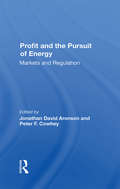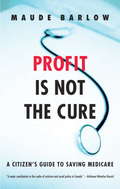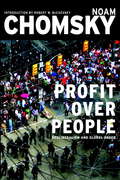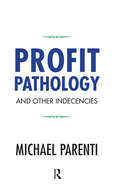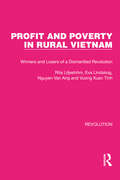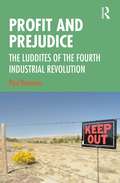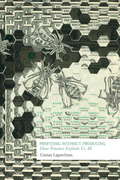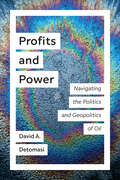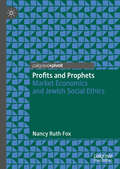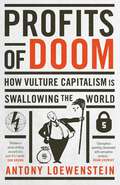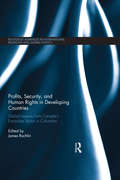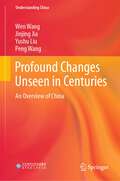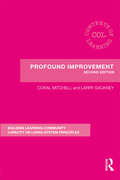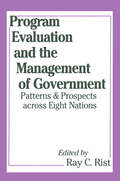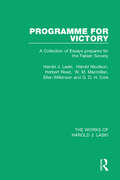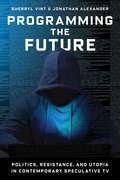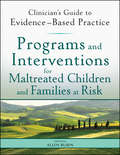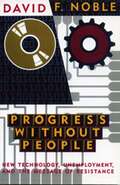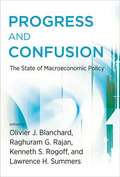- Table View
- List View
Profit And The Pursuit Of Energy: Markets And Regulation
by Jonathan D Aronson Peter F CowheyAmong the books on the world energy crisis, on technological possibilities for self-sufficiency, and on various energy sources, this is one of a very few to address the practicalities of government regulatory responsibilities versus the pursuit of profit in the private sector and to look at the processes, logistics, and complex interactions among private energy companies, financial sectors, and national governments. The authors provide answers to such questions as: How do oil company operations influence government policies? What kinds of energy projects can be financed by existing financial institutions? How does the availability of insurance affect innovations in energy? They also examine how major investors and governments make decisions about the management of the volatile mix of political, economic, and technological risks that buffet the energy sector; critique the conventional wisdom concerning the major fuels; and project the likely evolution of the world energy market over the next decade.
Profit Is Not the Cure
by Maude BarlowOn July 12, 1966, the Medical Care Insurance Act was passed by the federal House of Commons after a ferocious public debate that pitted the vast majority of Canadians against a powerful alliance of business, insurance companies, and doctors.More than thirty years later, the same battle is being fought all over again. Only now, the forces opposed to medicare are more ideologically unified, more richly endowed, and tied to transnational corporations whose power exceeds that of entire countries.In Profit Is Not the Cure, Maude Barlow traces the history of medicare in Canada. She compares it with both public and private systems in other parts of the world. And she contrasts it with the brutally divisive system that exists in the United States, where forty-four million people have no medical insurance, and millions more get minimal care through profit-driven health maintenance organizations. From the point of view of most patients, the United States health-care model is a disaster. But the proponents of privatization in Canada, supported by the right-wing media and corporate lobbyists, are determined to impose American-style "reforms" on the Canadian public. Three provinces - British Columbia, Alberta, and Ontario - are moving ahead rapidly to enlarge the role of commerce in the provision of health-care services. They are introducing user fees, delisting procedures that previously were covered, and encouraging private corporations to move into areas that used to be the exclusive domain of the public system.While the prime minister and federal cabinet have paid lipservice to the principles of medicare, they have made it clear by their actions that they will do nothing to impede the destruction of those principles by the provinces. In fact, their enthusiastic support of NAFTA, and the impending Free Trade Agreement of the Americas (FTAA) and General Agreement on Trade in Services (GATS), has made the defence of medicare increasingly difficult. Canadians overwhelmingly support medicare. Many, however, have been persuaded that it is a luxury we can no longer afford. Maude Barlow argues that this proposition is wrong. An earlier generation fought a bitter battle to bring medicare into existence. Another battle must be fought now to save it. But we owe it to the founders of the system, as well as to future generations, to take up the cause again. This important book shows the way.From the Hardcover edition.
Profit Over People: Neoliberalism and Global Order
by Noam ChomskyWhy is the Atlantic slowly filling with crude petroleum, threatening a millions-of-years-old ecological balance? Why did traders at prominent banks take high-risk gambles with the money entrusted to them by hundreds of thousands of clients around the world, expanding and leveraging their investments to the point that failure led to a global financial crisis that left millions of people jobless and hundreds of cities economically devastated? Why would the world's most powerful military spend ten years fighting an enemy that presents no direct threat to secure resources for corporations? The culprit in all cases is neoliberal ideology--the belief in the supremacy of "free" markets to drive and govern human affairs. And in the years since the initial publication of Noam Chomsky's Profit Over People: Neoliberalism and Global Order, the bitter vines of neoliberalism have only twisted themselves further into the world economy, obliterating the public's voice in public affairs and substituting the bottom line in place of people's basic obligation to care for one another as ends in themselves. In Profit Over People, Chomsky reveals the roots of the present crisis, tracing the history of neoliberalism through an incisive analysis of free trade agreements of the 1990s, the World Trade Organization, and the International Monetary Fund--and describes the movements of resistance to the increasing interference by the private sector in global affairs. In the years since the initial publication of Profit Over People, the stakes have only risen. Now more than ever, Profit Over People is one of the key texts explaining how the crisis facing us operates--and how, through Chomsky's analysis of resistance, we may find an escape from the closing net.
Profit Pathology and Other Indecencies
by Michael ParentiFrom market crisis to market boom, from welfare to wealth care, from homelessness to helplessness, and an all-out assault on the global environment-these are just some of the indecencies of contemporary economic life that Profit Pathology takes on. Here, Michael Parenti investigates how class power is a central force in our political life and, yet, is subjected to little critical discernment. He notes how big-moneyed interests shift the rules of the game in their favor while unveiling the long march by reactionaries through the nation's institutions to undo all the gains of social democracy, from the New Deal to the present. Parenti also traces the exploitative economic forces that have operated through much of American history, including the mass displacement and extermination of Native Americans and the enslavement of Africans. Parenti is a master at demonstrating the impact of monomaniacal profit accumulation on social services-especially health care-and human values. Here he takes us one step further, showing how unrestrained capitalism ultimately endangers itself, becoming a "self-devouring beast" that threatens us all. Finally, he calls for a solution based on democratic diversity and public ownership-"because it works."
Profit Pathology and Other Indecencies
by Michael ParentiFrom market crisis to market boom, from welfare to wealth care, from homelessness to helplessness, and an all-out assault on the global environment-these are just some of the indecencies of contemporary economic life that Profit Pathology takes on. Here, Michael Parenti investigates how class power is a central force in our political life and, yet, is subjected to little critical discernment. He notes how big-moneyed interests shift the rules of the game in their favor while unveiling the long march by reactionaries through the nation's institutions to undo all the gains of social democracy, from the New Deal to the present. Parenti also traces the exploitative economic forces that have operated through much of American history, including the mass displacement and extermination of Native Americans and the enslavement of Africans. Parenti is a master at demonstrating the impact of monomaniacal profit accumulation on social services-especially health care-and human values. Here he takes us one step further, showing how unrestrained capitalism ultimately endangers itself, becoming a "self-devouring beast" that threatens us all. Finally, he calls for a solution based on democratic diversity and public ownership-"because it works."
Profit Shifting and Tax Base Erosion: Case Studies of Post-Communist Countries (Contributions to Finance and Accounting)
by Danuše Nerudová Jan PavelThis book provides a comprehensive analysis of current techniques for profit shifting and tax base erosion in the area of corporate taxation and measurement. Firstly, it explains the relevance of the issue at hand – profit shifting and base erosion in the context of the 21st century. In turn, the book provides a comprehensive analysis of available techniques for the identification and measurement of profit shifting and base erosion, which adopt both the macro and micro perspective. It also provides examples from selected post-communist countries now in the EU, including the Czech Republic, Poland and Hungary. Concrete recommendations for economic policy round out the coverage.
Profit and Poverty in Rural Vietnam: Winners and Losers of a Dismantled Revolution (Routledge Library Editions: Revolution #24)
by Rita Liljeström Eva Lindskog Nguyen Van Ang Vuong Xuan TinhThis book, first published in 1998, studies the social impact of Doi Moi, a policy of economic renovation, on the living conditions in state forest enterprises and agricultural cooperatives in northern Vietnam. It compares the authors’ findings with those of 1987, before the formal adoption of the new economic policies – essentially the opening up of the economy to market forces.
Profit and Prejudice: The Luddites of the Fourth Industrial Revolution
by Paul DonovanAvoiding prejudice will be critical to economic success in the fourth industrial revolution. It is not the new and innovative technology that will matter in the next decade, but what we do with it. Using technology properly, with diverse decision making, is the difference between success and failure in a changing world. This will require putting the right person in the right job at the right time. Prejudice stops that happening. Profit and Prejudice takes us through the relationship between economic success and prejudice in labour markets. It starts with the major changes that occur in periods of economic upheaval. These changes tend to be unpopular and complex – and complexity encourages people to turn to the simplistic arguments of ‘scapegoat economics’ and prejudice. Some of the changes of the fourth industrial revolution will help fight prejudice, but some will make it far worse. The more prejudice there is, the harder it will be for companies and countries to profit from the changes ahead. Profit is not the main argument against prejudice, but can certainly help fight it. This book tells a story of the damage that prejudice can do. Using economics without jargon, students, investors and the public will be able to follow the narrative and see how prejudice can be opposed. Prejudice is bad for business and the economy. Profit and Prejudice explains why.
Profiting Without Producing
by Costas LapavitsasFinancialization is one of the most innovative concepts to emerge in the field of political economy during the last three decades, although there is no agreement on what exactly it is. Profiting Without Producing puts forth a distinctive view defining financialization in terms of the fundamental conduct of non-financial enterprises, banks and households. Its most prominent feature is the rise of financial profit, in part extracted from households through financial expropriation. Financialized capitalism is also prone to crises, none greater than the gigantic turmoil that began in 2007. Using abundant empirical data, the book establishes the causes of the crisis and discusses the options broadly available for controlling finance.
Profits and Power: Navigating the Politics and Geopolitics of Oil (UTP Insights)
by David A. DetomasiOil fuels the global economy and remains a staple of our energy system. Yet, its production and use continue to draw negative criticism, and an increasing number of people want to reduce or eliminate its use altogether. Profits and Power sheds light on how the oil system works, its key players, and the political and geopolitical issues related to its use. Starting in the second half of the nineteenth century, the book traces the fascinating history of how oil production and its sale became the world’s most profitable business. Tracing distinct eras in oil’s past, Profits and Power shows how periods defined by shifts in price often dictated who controlled production, and who enjoyed the often enormous riches oil production generated. David A. Detomasi weaves together politics, geopolitics, and economics to provide a complete picture of how the system really works, and what direction it will take in the future. As the world becomes increasingly aware of the dangers and challenges oil dependency creates, knowledge of this crucial commodity has never been more relevant and critical for humanity’s future. Profits and Power will resonate with anyone interested in, or charged with responding to, our evolving energy future.
Profits and Prophets: Market Economics and Jewish Social Ethics
by Nancy Ruth FoxThis book is a study of potential, perceived, and real conflicts and similarities between market economics and Jewish social justice. The book’s ultimate focus is on public policy issues. In the first two chapters, the author presents the conceptual and theoretical foundations of market economics and Jewish social justice. Subsequent chapters analyze minimum wage, immigration, climate change, and usury from both market economics and Jewish social justice perspectives, discussing conflicts, and, if they exist, similarities.
Profits of Doom: How vulture capitalism is swallowing the world: Updated Edition
by Antony LoewensteinVulture capitalism has seen the corporation become more powerful than the state, and yet its work is often done by stealth, supported by political and media elites. The result is privatised wars and outsourced detention centres. Mining companies pillaging precious land in developing countries and struggling nations are invaded by NGOs and the corporate dollar. Best-selling journalist Antony Loewenstein travels to Afghanistan, Pakistan, Haiti, Papua New Guinea and across Australia to witness the reality of this largely hidden world of privatised detention centres, the cost of cheap clothing manufacturing and militarised private security. Who is involved and why? Can it be stopped? What are the alternatives in a globalised world? Profits of Doom challenges the fundamentals of our unsustainable way of life and the money-making imperatives driving it.Endorsements for Profits of Doom: 'In Australia, so often bereft of voices of dissent and courage, Antony Loewenstein's tenacious work stands out. Profits of Doom is a journey into a world of mutated economics and corrupt politics that we ignore at our peril.' - John Pilger, independent investigative journalist, author and documentary film-maker 'A great exercise in joining the dots, on essential terrain that too often is ignored. At a time when rapacious private interests campaign to destroy government - so they can cash in on its absence - Loewenstein reports from the frontline in an insidious war.' - Paul McGeough, author of Kill Khalid and chief foreign correspondent for The Sydney Morning Herald 'The competition for the most depraved example of the predatory state capitalism of the Reagan-Thatcher neoliberal era is fierce. In this chilling study, based on careful and courageous reporting, and illuminated with perceptive analysis, Antony Loewenstein presents many competitors for the prize, while also helping us understand all too well the saying that man is a wolf to man.' - Noam Chomsky, Institute Professor at MIT and Professor of Linguistics and Philosophy, political activist and author 'Profits of Doom nails the mad idea that the drive for profits will create global wellbeing. Antony Loewenstein delivers a spine-chilling account of the post 9/11 world taken over by vulture capitalism and its political cronies. And this is what we are voting for.' - Bob Brown, former leader of the Australian Greens and director of Sea Shepherd 'Antony Loewenstein's Profits of Doom is a powerful indictment of the corporations and governments across the globe whose unquenchable thirst for resources and power threaten the stability - perhaps even the very existence - of the planet. Loewenstein is no armchair academic or cubicle journalist. The stories in the book are the product of years embedded, in military and economic warzones, with the disempowered of the world, the people from Pakistan to Papua New Guinea and beyond who have the audacity and bravery to fight back against all odds. Loewenstein's keen sense of justice is evident on every page of this book as he gives voice to the voiceless and confronts the powerful. Profits of Doom is a devastating, incisive follow-up to Naomi Klein's The Shock Doctrine.' - Jeremy Scahill, international best-selling author of Dirty Wars and Blackwater
Profits, Security, and Human Rights in Developing Countries: Global Lessons from Canada’s Extractive Sector in Colombia (Routledge Advances in International Relations and Global Politics #122)
by James RochlinThe extractive sector is a particular area of expertise for Canada and more than half of Canada’s mining assets abroad are located in Latin America, specifically in Brazil, Peru, Chile, and Colombia. The Canada-Colombia accord was the first free-trade agreement in the world to include annual Human Rights Impact Assessments (HRIA), and also includes a labour side accord where abuse complaints can be formally registered. Using Colombia as a case study, James Rochlin and his international and multidisciplinary line up of Canadian and Colombian scholars, and activists working in the area of human rights, and the judiciary explore: What is the best way to identify and operationalize for mutual benefit the concentric space between the interests of extractive corporations in profit and security, on the one hand, and the interests of the host communities in the promotion of human rights and human security, on the other? What can the four emblematic and diverse cases in Colombia (Meta, Sergovia, Marmato, and Bolivar/La Guajira) tell us about how to fine tune and improve a newly implemented governmental HRIA to render it an increasingly useful global instrument to promote simultaneously corporate security and human security for host communities? What is the most efficient and effective way to design and implement Corporate Social Responsibility Programs in a manner that promotes simultaneously corporate security and community human security? Written in a clear and accessible style, Profits, Security, and Human Rights presents practical lessons on how to promote both corporate security and human security in communities where the extractive sector operates in the Global South.
Profound Changes Unseen in Centuries: An Overview of China (Understanding China)
by Peng Wang Wen Wang Jinjing Jia Yushu LiuThis book focuses on the current internal and external situation China is facing both from a macro perspective and a theoretical height, and puts forward practical development strategies and diplomatic ideas. It is of great methodological significance. At home, the development thought after the conclusion of the hundred-year change is the guiding thought for China's further development, and abroad, the international communication and the construction of international order highlighted by the hundred-year change also have important reference significance for the world's development.
Profound Improvement: Building Capacity for a Learning Community (Contexts of Learning)
by Coral Mitchell Larry SackneyThe book discusses the idea of the learning community as a vehicle for professional learning and school development. As the authors show, the learning community develops in response to building capacity in three domains: personal, interpersonal and organizational. In the personal domain, educators deconstruct and reconstruct their professional narratives to enhance student learning and professional practice. In the interpersonal domain, educators generate norms and values that foster experimentation and critical analysis of educational practice and that promote collective and individual learning. In the organizational domain, visible and invisible structures are constructed that enable community members to enact educational practices in support of profound improvement in teaching and learning. This revised and updated edition of Profound Improvement not only brings this important work up-to-date but also shows how the authors thinking has changed and developed since the book was originally written. The book focuses on the life of educators as it relates to professional learning and growth. It is concerned with human growth and development, human cognition and affect and human interactions and actions in the context of a school community. For the new edition the authors also: elaborate more fully the notion of learning communities based on living systems and ecological perspectives develop their capacity building model They show that building a learning community is a dynamic process that engages the individual, the group and the organization in embedded interdependencies and mutual influences. As the authors clearly demonstrate: education is a living system as opposed to a managed system.
Profusely Illustrated: A Memoir
by Edward SorelThe fabulous life and times of one of our wittiest, most endearing and enduring caricaturists—in his own words and inimitable art. Sorel has given us "some of the best pictorial satire of our time ... [his] pen can slash as well as any sword&” (The Washington Post).Alongside more than 172 of his drawings, cartoons, and caricatures—and in prose as spirited and wickedly pointed as his artwork—Edward Sorel gives us an unforgettable self-portrait: his poor Depression-era childhood in the Bronx (surrounded by loving Romanian immigrant grandparents and a clan of mostly left-leaning aunts and uncles); his first stabs at drawing when pneumonia kept him out of school at age eight; his time as a student at New York&’s famed High School of Music and Art; the scrappy early days of Push Pin Studios, founded with fellow Cooper Union alums Milton Glaser and Seymour Chwast, which became the hottest design group of the 1960s; his two marriages and four children; and his many friends in New York&’s art and literary circles. As the &“young lefty&” becomes an &“old lefty,&” Sorel charts the highlights of his remarkable life, by both telling us and showing us how in magazines and newspapers, books, murals, cartoons, and comic strips, he steadily lampooned—and celebrated—American cultural and political life. He sets his story in the parallel trajectory of American presidents, from FDR&’s time to the present day—with the candor and depth of insight that could come only from someone who lived through it all. In Profusely Illustrated, Sorel reveals the kaleidoscopic ways in which the personal and political collide in art—a collision that is simultaneously brilliant in concept and uproarious and beautiful in its representation.
Program Evaluation For Social Workers (Seventh Edition): Foundations Of Evidence-based Practice
by Richard M. Grinnell Yvonne A. Unrau Peter A. GaborNow in its seventh edition, this comprehensive text once again provides beginning social work students and practitioners with a proven, time-tested approach to help them understand and appreciate how to use basic evaluation techniques within their individual cases (case-level) and the programs where they work (program-level). As with the previous six editions, this text is eminently approachable, accessible, straightforward, and most importantly, practical.
Program Evaluation and the Management of Government
by Eliot Freidson Ray RistThis book appears at an opportune time in the history of evaluation. Its detailed and up-to-date account of the organization and use of evaluation in eight Western, democratic countries—Canada, Germany, United Kingdom, United States, Denmark, Holland, Norway, and Switzerland—shows how evaluation functions at different levels of development. Focusing on the national or federal level of government, this volume presents a systematic and comparative view of eight nations at different stages of the development, institutionalization, and utilization of evaluations. All of these original contributions have been written by academics and government officials involved in the production and use of evaluation findings. Each shows how their respective country has moved to institutionalize evaluation at the federal level, and each explores the reasons for that institutionalization. Among them are managerial accountability, the increased complexity of the decisions facing policymakers, federally sponsored social change that needs to be tracked and assessed, and the increasing recognition that political power comes to those who possess such information. Program Evaluation and the Management of Government is tightly integrated. The contributions share coherence, a common analytic framework and use of key terms, resulting from the authors’ three-year dialogue as members of the Working Group on Policy and Program Evaluation sponsored by the International Institute for Administrative Sciences located in Belgium. Their shared commitment to working together has given us the first systematic effort to assess evaluation across such a large number of countries. It will be of interest to applied social scientists and policymakers, especially those interested in comparative research.
Program Management of Technology Endeavours: Lateral Thinking in Large Scale Government Program Management
by Ali M. Al-KhouriProgram Management of Technology Endeavours.
Programme for Victory (The Works of Harold J. Laski)
by Herbert Read Harold Nicolson Ellen Wilkinson Harold J. Laski W. M. Macmillan G. D. ColeWritten two years after the commencement of the Second World War, the chapters in this book succinctly put forward the case for reorganizing the foundations of the social order, by rejecting capitalism and historical equilibrium, both in Europe and further afield in the British Empire, in favour of building a Socialist civilization.
Programming the Future: Politics, Resistance, and Utopia in Contemporary Speculative TV
by Professor Sherryl Vint Professor Jonathan AlexanderFrom 9/11 to COVID-19, the twenty-first century looks increasingly dystopian—and so do its television shows. Long-form science fiction narratives take one step further the fears of today: liberal democracy in crisis, growing economic precarity, the threat of terrorism, and omnipresent corporate control. At the same time, many of these shows attempt to visualize alternatives, using dystopian extrapolations to spotlight the possibility of building a better world.Programming the Future examines how recent speculative television takes on the contradictions of the neoliberal order. Sherryl Vint and Jonathan Alexander consider a range of popular SF narratives of the last two decades, including Battlestar Galactica, Watchmen, Colony, The Man in the High Castle, The Expanse, and Mr. Robot. They argue that science fiction television foregrounds governance as part of explaining the novel institutions and norms of its imagined futures. In so doing, SF shows allegorize and critique contemporary social, political, and economic developments, helping audiences resist the naturalization of the status quo. Vint and Alexander also draw on queer theory to explore the representation of family structures and their relationship to larger social structures. Recasting both dystopian and utopian narratives, Programming the Future shows how depictions of alternative-world political struggles speak to urgent real-world issues of identity, belonging, and social and political change.
Programs and Interventions for Maltreated Children and Families at Risk
by Allen RubinEvidence-based interventions are increasingly being required by third-party payers and an evidence-based orientation has come to define ethical practice. This compendium of short, how-to chapters focuses on the programs and interventions to prevent child maltreatment that have the best scientific evidence supporting their effectiveness. Interventions and programs discussed include Cognitive Behavioral Therapy, EMDR, Multisystemic Therapy, Coping Cat, and many more. Busy practitioners will appreciate this book's implementation of evidence-based practices by providing the practical and "what now" rather than using the typical academic approach.
Programs to Reduce Teen Dating Violence and Sexual Assault: Perspectives on What Works
by Arlene Weisz Beverly BlackArlene Weisz and Beverly Black interview practitioners from more than fifty dating violence and sexual assault programs across the United States to provide a unique resource for effective teen dating violence prevention. Enhancing existing research with the shared wisdom of the nation's prevention community, Weisz and Black describe program goals and content, recruitment strategies, membership, structure, and community involvement in practitioners' own words. Their comprehensive approach reveals the core techniques that should be a part of any successful prevention program, including theoretical consistency, which contributes to sound content development, and peer education and youth leadership, which empower participants and keep programs relevant.Weisz and Black show that multisession programs are most useful in preventing violence and assault, because they enable participants to learn new behaviors and change entrenched attitudes. Combining single- and mixed-gender sessions, as well as steering discussions away from the assignment of blame, also yield positive results. The authors demonstrate that productive education remains sensitive to differences in culture and sexual orientation and includes experiential exercises and role-playing. Manuals help in guiding educators and improving evaluation, but they should also allow adolescents to direct the discussion. Good programs regularly address teachers and parents. Ultimately, though, Weisz and Black find that the ideal program retains prevention educators long after the apprentice stage, encouraging self-evaluation and new interventions based on the wisdom that experience brings.
Progress Without People: New Technology, Unemployment, and the Message of Resistance
by David F. NobleA provocative discussion of the role of technology and its accompanying rhetoric of limitless progress in the concomitant rise of joblessness and unemployment.
Progress and Confusion: The State of Macroeconomic Policy
by Raghuram Rajan Kenneth Rogoff Olivier Blanchard Lawrence H. SummersWhat will economic policy look like once the global financial crisis is finally over? Will it resume the pre-crisis consensus, or will it be forced to contend with a post-crisis "new normal"? Have we made progress in addressing these issues, or does confusion remain? In April of 2015, the International Monetary Fund gathered leading economists, both academics and policymakers, to address the shape of future macroeconomic policy. This book is the result, with prominent figures -- including Ben Bernanke, Lawrence Summers, and Paul Volcker -- offering essays that address topics that range from the measurement of systemic risk to foreign exchange intervention. The chapters address whether we have entered a "new normal" of low growth, negative real rates, and deflationary pressures, with contributors taking opposing views; whether new financial regulation has stemmed systemic risk; the effectiveness of macro prudential tools; monetary policy, the choice of inflation targets, and the responsibilities of central banks; fiscal policy, stimulus, and debt stabilization; the volatility of capital flows; and the international monetary and financial system, including the role of international policy coordination. In light of these discussions, is there progress or confusion regarding the future of macroeconomic policy? In the final chapter, volume editor Olivier Blanchard answers: both. Many lessons have been learned; but, as the chapters of the book reveal, there is no clear agreement on several key issues. ContributorsViral V. Acharya, Anat R. Admati, Zeti Akhtar Aziz, Ben Bernanke, Olivier Blanchard, Marco Buti, Ricardo J. Caballero, Agustín Carstens, Jaime Caruana, J. Bradford DeLong, Martin Feldstein, Vitor Gaspar, John Geanakoplos, Philipp Hildebrand, Gill Marcus, Maurice Obstfeld, Luiz Awazu Pereira da Silva, Rafael Portillo, Raghuram Rajan, Kenneth Rogoff, Robert E. Rubin, Lawrence H. Summers, Hyun Song Shin, Lars E. O. Svensson, John B. Taylor, Paul Tucker, José Viñals, Paul A. Volcker
